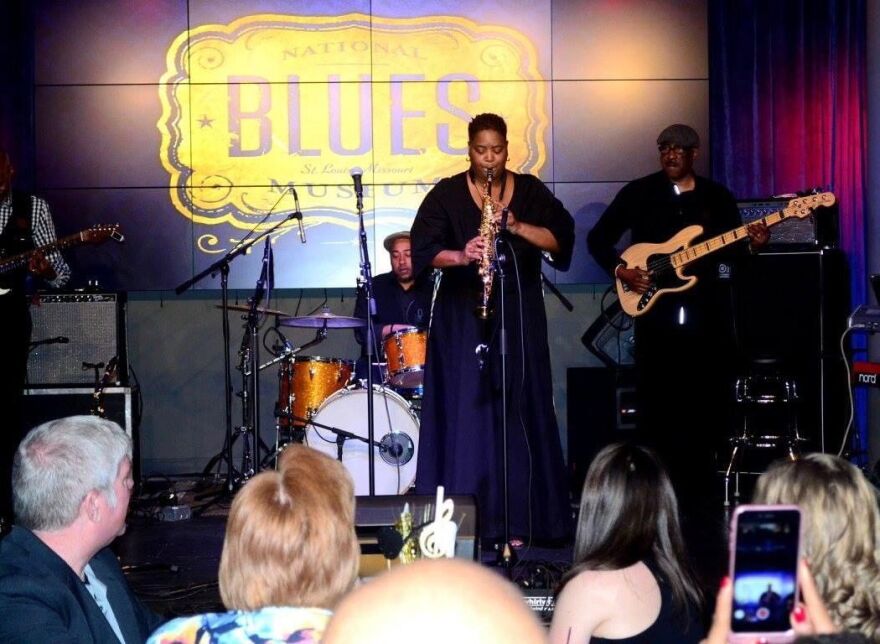When saxophonist Lisella Martin (pronounced: lee-SELL-ah) headlines this Saturday’s Front Street Music Festival in downtown Bloomington, she’ll proudly bring with her the rich musical history of East St. Louis, a city often in the national spotlight for various troubles.
She spoke with WGLT’s Jon Norton about her hometown, her music influences, and why she doesn’t want to be boxed into a specific genre.
WGLT: You were born and raised in East St. Louis. That’s a city that gets a lot of notoriety for being dysfunctional and for its high murder rate. You embrace your hometown. What was it like for you growing up?
MARTIN: The only reason why I wanted to go to public school was because they had a band, and my particular school did not have band instruments … we just had like recorders. And I was like, “I want to play an instrument.” And that's kind of what drove me to public schools. But even in public schools, I can't say that I had a bad experience. I was in Principal Scholars Program and the band - we had trips every other weekend, we were somewhere out of town. I grew up in church and church every Sunday involved choir, and we had a youth group that met every week. I don't have any bad memories of you, St. Louis.
When you talk about East St. Louis and even mention the word “jazz,” even if it's smooth jazz, you can't mention that word and East St. Louis without mentioning Miles Davis, right? Or having Miles Davis looking over your shoulder, perhaps?
MARTIN: 100%. You can't say East St. Louis without thinking of Miles Davis and the multitude of excellent musicians that come from East St. Louis, I grew up with some and I admire many. Part of my whole persona is being the best that I can be because of what I'm representing. I feel like I'm representing East St. Louis and that deep, rich musical history every time I get to the stage.
You're a smooth jazz player, though you admire the straight-up jazz players. Who are some of your mentors or inspirations that you came to play this kind of music.
MARTIN: The first time that I really took notice of the smooth jazz saxophone was listening to Walter Beasley. And I admired him because not only did he play the saxophone, but he also was a vocalist. As far as my strongest influences, I would say David Sanborn, Grover Washington, and Kirk Whalum. Kirk Whalum really is a strong influence because when he plays, I can actually hear words and that's a goal of mine. My memory is what gets in the way of that … sometimes I get lost in the music, but listening to Kirk Whalum and how he's able to express himself with the horn. And he does play straight-up jazz. He plays smooth jazz too. But when he plays smooth jazz, you can just about imagine … well, for me anyway … that I can hear lyrics when he plays.
You mentioned that you went to public school because they had music instruments that you wanted to play. But you didn't end up going into music full time after all of that, right? You kind of came to touring later in life.
MARTIN: Absolutely. One of the things when I was entering or deciding to go to college was teaching. That was something I had coming from a family of educators. My mom, my aunt, and my sister-in-law were all educators. And that's what I felt my calling was. So, I did pursue elementary education. My minor was vocal music … music was something that I would play on a Sunday at church … I grew up playing in church. So, that was really my musical outlet at the time. Although I did play … I played in the St. Louis University jazz band for a couple of years ... I just did not see music performance as something that I would do professionally. Not until I was playing in church, and the guitar player kind of leaned forward and he said, “Hey, you ever thought about playing professional?” And my first thought was, “I'm not good enough for that.” That's not something I wanted to do at that time and he said, “You'll never know unless you try.” And that's kind of what happened.
For my 50th birthday, I decided I'm going to put a band together, have a big party and give my gift to others and see exactly what my response … what my feedback would be … and decided if I did receive positive support and feedback that I would go ahead and pursue my musical interests professionally.
It sounds like you got some good feedback because you're on the road a little bit more. And the name of your band is The MLO Soul Concept. MLO stands for “music lovers only.” Is that a moniker for the type of person you want in your band, or maybe an idea that, “music is music, don't try to stuff me into a specific genre"?
MARTIN: That's exactly it. No genre is untouchable. There are a lot of songs that I love that are sung by men to women, and not so much women to men. So my thing was, “Oh my goodness, am I playing men's music?” And then I thought, “No, you're a musician.” But then, my musical tastes … Chicago, Journey, Billy Joel, Bonnie Raitt, Chris Stapleton, all of that, in addition to Mary J. Blige and Whitney Houston, Luther Vandross. I love music, so when I think of the type of songs that I want to interpret or say or do in my own way. I just choose good music and there is no genre that is above that. When I say “music lovers only,” I'm also talking about myself, those that may be in the audience in general. This concept is for people who love good music
Lisella Martin headlines the Front Street Music Festival on Saturday night in downtown Bloomington. The show is part of the WGLT Summer Concert Satellite Series presented by CEFCU.


